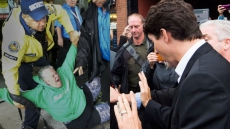VICTORIA — There's a generation of indigenous people across Canada who were once shamed for speaking their own language.
Now, people who didn't learn their mother tongue from their parents are key to saving and revitalizing the languages, British Columbia researchers say.
Two University of Victoria indigenous languages experts whose own parents did not speak their aboriginal languages at home are moving to bridge the language gap with a mentor-apprentice program that teaches adults.
"There were generations of people, my parents and grandparents, who were sent to residential school and forbidden to speak their language and beaten and shamed and ridiculed and punished in all sorts of awful ways for speaking the language," said Peter Jacobs, a UVic linguist and fluent speaker of his Squamish Nation language.
"A lot of those people who came out of that school system chose not to teach their children the language," he said. "My dad doesn't speak Squamish as his first language for that very reason even though both his parents were fluent speakers. That caused a big disruption."
There are almost 60 indigenous languages spoken in Canada, with B.C. leading the country with 34 languages.
A November 2014 report by British Columbia's First Peoples' Cultural Council found a decline in fluent indigenous language speakers but an increase in semi-fluent speakers. The study looked at 129,000 people in B.C. who speak an indigenous language and found 60 per cent of fluent speakers are aged 65 and older, while one in three semi-fluent speakers are under the age of 25.
The program focuses on adults learning an indigenous language by being paired with a fluent speaker who is a mentor. The teacher and student are immersed in a curriculum where classes could involve hunting expeditions or family chores but are conducted entirely in the indigenous language.
Onowa McIvor, director of UVic's indigenous education department, said she and Jacobs are compiling three years of data from 67 participants in the mentor-apprentice program. The participants range in age from young adults who recently completed high school to people in their 50s, she said.
"These are the people, the first generation, their parents didn't teach the language to them," said McIvor, a Cree from Norway House, Man., who completed the mentor-apprentice program as an apprentice.
"Their parents were growing up in a Canada where it wasn't cool to be Indian," she said. "In fact, most indigenous people thought they were doing right by their kids and doing better for their kids by not teaching them the language."
McIvor said she believes the researchers' work is "a tangible example of reconciliation in action."

Participants have noticed their connections with relatives and their traditions have strengthened along with their language skills, she said.
"We are seeing what's happening on the ground and we are watching in our lifetimes, in the last 10 or 15 years that Peter and I have worked in the field, we've witnessed new speakers, new adult speakers of the language."
Elisha Elliott is a graduate of the program and is an indigenous languages teacher at Lau Welnew Tribal School at Brentwood Bay, about 20 kilometres northwest of Victoria.
Elliott, 29, known by her indigenous name Menetiye, pronounced Monethia, said her first language lessons with elders from the Tsartlip First Nation involved playing with dolls to learn the Sencoten language of southern Vancouver Island. She's now teaching elementary students.
She said the time is right for indigenous languages even though many fluent elders have died in recent years.
"What we're doing now, I don't think could have been done back then. It's come at a time when there's been enough healing."
Elliott said her students are reading, writing and solving math problems using their indigenous language.
Earlier this month, a Vancouver Island Grade 8 student stunned a gathering of national aboriginal leaders and federal Indigenous Affairs Minister Carolyn Bennett by saying he volunteered to become his school's indigenous language teacher.
Tim Masso, 13, said he volunteered to help teach the indigenous studies course at Ucluelet Secondary School on British Columbia's west coast even though he is still learning the Nuu-chah-nulth language.


